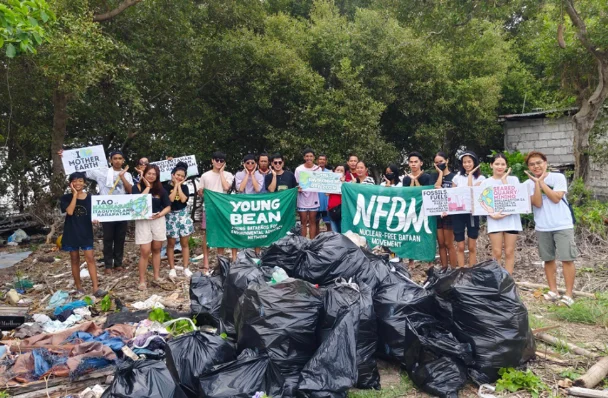Mangroves Ecosystem: A VICTIM OF PLASTICS POLLUTION
By: C-Help Team

Mangroves are species-building ecosystem that support biodiversity, climate regulation, and coastal communities. Along with seagrass and corals, mangroves enhance the food -production capacity of our coastal and marine areas, allowing humans to greatly benefit from the oceans bounty and helping ensure global food security.
Mangroves are the community’s natural defense against the threats of climate change effects such as storm surges during violent storms, and sea level rise with the melting of the ice on both ends of the world.
Unfortunately, despite the benefits it provides, mangroves face serious threats in the Philippines, mostly because of destructive human activities.
Plastics emitted into the marine environment endanger marine life due to entanglement, ingestion, and interaction which detrimentally affects marine ecosystems when not managed properly (WWF, 2022).
Additionally, plastics pose a serious threat to mangroves, observed worldwide, not only in Asia, and has recently emerged in the form of ocean plastic pollution.
Known as one of the most mangrove-rich countries globally, the Philippines is not unique in its sad experience of massive mangrove deforestation.
Thankfully, the world is not taking the challenge of conserving and regrowing and restoring our mangrove forest sitting down.
Efforts of the People
In the Philippines, government efforts to protect and conserve our remaining mangroves is getting the much-needed boost from environmental groups, academe, and nongovernment organizations with the help of the international community.
Take for instance the effort of the group Young Bataeῆos for Environmental Advocacy Network (YoungBEAN). On June 5, World Environment Day, YoungBEAN, in partnership with Nuclear/Coal-Free Bataan Movement, PANGISDA Bataan and the Sangguniang Kabataan of Barangay Camachile, have launched an environmental awareness activity through the coastal- clean drive to raise public awareness on the many challenges that confront the environment today and urging the public to take a stand to preserve the environment.
The group also held a discussion on the urgency of climate and environmental action to preserve and defend the environment.
Eric Beren, YoungBEAN Secretary General, urged the public to take a stand to preserve the environment and called on the government to put a premium on the welfare and rights of communities over business interests.
Challenging the Business Sector
However, this project is only a part of what should be a bigger endeavor—efforts coming from the major plastic polluters themselves, the top fast moving consumer goods (FMCG) corporations.
In November 2022, C-HELP filed a case on behalf of a group of consumers that included fishermen against seven companies namely Coca-Cola Inc., PepsiCo Inc., Nestle, Unilever, Colgate-Palmolive, Universal Robina Corp. (URC), and Procter and Gamble (P&G) for their alleged false or misleading advertisement of product recyclability.
The complaint was filed before the Department of Trade and Industry (DTI) - Fair Trade Enforcement Bureau (FTEB).
These respondents in the landmark case are the same companies found to be the biggest plastic waste contributors in the world and the Philippines consistently from 2019 to 2022 based on waste brand audit reports of the Break Free from Plastic Movement.
Plastic packaging employed by the respondents poses a significant threat to both human health and the environment and worse, the respondents have neglected to provide any warning regarding such potential danger.
Instead, their labels, websites, and media statements falsely assert that their plastic packaging is recyclable—a misleading advertisement. Such practices are deemed to violate consumer rights.
Of the seven respondent companies, one company, P&G, offered to sit down and dialogue with the complainants. Through their lawyers, the complainants Efren Andrade et al, and the respondents, P&G and P&G Philippines, have signed a mediation agreement putting to rest the complaint for alleged violation of Republic Act No. 7394 or the Consumer Act of the Philippines.
The mediation agreement states that during the mediation conferences held by the DTI-FTEB and further dialogues, the respondents have been able to address the claims of the complainants to their satisfaction and the parties agreed to amicably settle the case for the complainants to withdraw the complaint subject to certain conditions.
Part of the terms and conditions of the agreement is the symbolic and “goodwill” refund of the purchase price of the product which is the subject of the complaint against P&G.
Also, as a part of the agreement, the respondents will review recommended improvements on recycling labels based on the complainants’ suggestions.
Although the respondents will have sole discretion to implement or not the recommended improvements, the complainants reserve the right to take appropriate action should the concern remain unaddressed despite the completion of exhausting open communication between the
parties.
Under the agreement, the parties will endeavor to maintain open communication and undertake bi-annual closed-door meetings this year, to hear the complainants’ environmentally sustainable solutions to reduce plastic and promote reuse and refill packaging.
As for the six other companies, the case is expected to move to the next level with the complainants determined to make the ocean plastic polluters pay for their crime.
